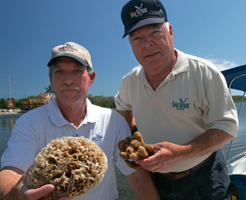Don Sweat, the recently retired Florida Sea Grant marine extension agent for a multi-county region on the state’s West Coast, has been awarded the national William Q. Wick Visionary Career Leadership Award in recognition of his career achievements in Sea Grant Extension.
Sweat was the first extension agent hired by Florida Sea Grant’s then-fledgling marine extension program in 1977. Upon his retirement earlier this year, he served as marine extension agent for Pinellas, Pasco, Hernando, Citrus and Levy counties.
His accomplishments in aquaculture, commercial fisheries and marine education still resonate with coastal residents today. He is credited with helping found The Pier Aquarium in St. Petersburg, changing state regulations that govern the state’s marine sponge industry, and playing a principal role in research efforts that resulted in the re-opening of the recreational scallop fishery off Citrus and Hernando counties.
“It’s difficult to begin to explain the impact and vision of a person that helped lay the foundation for the research and extension services provided through the Florida Sea Grant program on the west coast of Florida,” said Michael Spranger, the associate director for Sea Grant extension and education. Florida Sea Grant Extension functions as part of the Institute of Food and Agricultural Sciences Extension at the University of Florida.
“When Don started work, there was no template or path to follow, but his experience, talent and concerns regarding a variety of coastal issues, and his desire to help others have forged an approach that still serves the entire Sea Grant program,” Spranger said.
The Wick Award is given every other year by the extension program leaders of the 32 Sea Grant programs nationwide to recognize retired or soon-to-retire individuals for outstanding achievements in extension programming or administration.

Sweat began his Sea Grant career providing extension programs to the Greater St. Petersburg area and several coastal counties north. He brought expertise in fisheries and aquaculture to the program, having worked seven years as vice president for the former Sea Farms, Inc., of Key West. The 2500-acre shrimp farm he built for that company in Honduras still operates today.
In 1988, he became a founding board member of the nonprofit Pier Aquarium to help provide educational experiences from the local marine environment to the community. Last year, the aquarium received more than 80,000 visitors. Sweat was also instrumental in establishing the aquarium’s annual Kids’ Fishing Tournament, teaching responsible fishing practices to hundreds of youngsters each year.
Sweat provided a key link between University of South Florida and University of Florida researchers in the scallop seed production and spawning process, which became an integral part of ongoing work to provide the juvenile scallops needed for restoration efforts along the Florida coast. His efforts have contributed to the re-opening of areas once closed to recreational scalloping along Florida’s West Coast.
He spent more than 20 years as part of the UF team that documented the sustainability of the state’s commercial sponge fishery, with far-reaching implications for the industry. Among the outcomes, the research showed that if spongers changed from tearing to cutting sponges loose from the sea floor, the remaining sponge tissue could nearly double its ability to regenerate to a harvestable size. The change was endorsed by both the sponge industry and state regulators, and is now law. The team’s research on long-term recovery of marine sponge populations in the Florida Keys is routinely presented at national and international conferences.
Sweat served as a board member of the World Aquaculture Society, and is a fellow of the American Institute of Fishery Research Biologists. He is also a member of the International Pectinid Society, and helped host the organization’s 2003 biennial meeting in St. Petersburg that attracted more than 125 participants from 25 countries